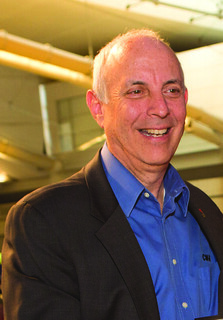Search News
For the Media
For media inquiries, call CWA Communications at 202-434-1168 or email comms@cwa-union.org. To read about CWA Members, Leadership or Industries, visit our About page.
Also in Summer 2014
- Update on Senate Rules
- President Elected By National Popular Vote? AMEN
- Reid: 'What a System'
- Congress, States Working to Get Big Money Out of Politic$
- CWA Town hall Call Takes on Money in Politics
- Kick Brunei Out of TPP Talks
- House Democratic Caucus Tells Froman:
- How Building Our Movement Helps Us Beat TPP
- Taking It To the 'UnCarrier'
- NLRB General Counsel Consolidates Complaints Against T-Mobile
- Stand Up, Fight Back
- The Moral Mondays Campaign is Spreading Its Wings into Other States
- Will Corporate States Replace Nation States?
- Verizon Wireless Retail Store Workers in Brooklyn Vote CWA
Putting the Pieces Together
 |
| Larry Cohen, CWA President |
The outlook for bargaining rights in the U.S. and our ability to maintain our current standard of living, let alone improve it, is as hard as it’s ever been. This issue of the CWA News looks at what we need to do to turn that around. It’s not one thing. It is several pieces we need at the same time to build a movement for real change.
Today, just 6.6 percent of private sector workers have union representation. When CWA formed in 1948, nearly 35 percent of private sector workers had bargaining rights. Ten million organized in the prior 10 years – that’s the kind of movement we need to build again. It wasn’t just workers organizing, as effective as the sit down strikes and other campaigns were. It wasn’t just community organizing, as effective campaigns reached out to immigrant and other communities. And it certainly wasn’t just the New Deal or the National Labor Relations Act. It was a combination of all those things, building a mass movement in workplaces, communities, and politically, that brought workers’ rights to two generations of Americans.
What happened next?
As early as the 1940s, corporations starting running anti-union campaigns. We’ve had 70 years of “corporations are people,” with companies pushing to exercise their “right to free speech” through captive audience meetings, workplace intimidation and harassment of union supporters. Now, in 2014, it’s harder than ever for workers who want a union in their workplace. It’s not that workers don’t know about bargaining rights, or that we haven’t been working hard enough. It’s that most corporate management is determined to block progress for working people, and we won’t change this by ourselves.
Look at T-Mobile USA. In Germany, the company recognizes the union and practices participatory management. Here, the company runs a national campaign of suppression of workers’ rights. T-Mobile’s practices are so bad that the National Labor Relations Board took the extraordinary step of consolidating the complaints against T-Mobile, so that there can be coordinated prosecution. The NLRB doesn’t do this lightly; only Walmart has been cited in the same way.
Bargaining rights are key to a democracy, to enable workers to have a voice and make economic gains. That’s why in Brazil, where 40 percent of workers now have bargaining rights, the standard of living has improved dramatically. In Brazil 25 years ago, organizers and others doing social justice work would most likely end up in prison or exile. Today, leaders in Brazil, Chile and Argentina have built a democracy movement and have made a real difference. They said no to the oligarchies that were strangling ordinary citizens. For example, in Brazil’s financial sector, bank workers in Sao Paolo now get paid more than those in New York City.
In Germany and France, works councils mean workers have a voice in what happens on the job. Germany also has codetermination where just less than half of the management board are elected worker representatives.
In the U.S., however, workers’ collective bargaining rights are continually under attack. The International Trade Union Confederation now rates the U.S. a “4” (out of 5) below 78 other nations in comparing workers’ rights. U.S. management exports our jobs, not our products and services, and cuts our living standard as they maximize profits. And all the policy papers and policy positions won’t change anything if we don’t build a democratic movement with the power to stop them and move forward on a new populist agenda.
In this issue of the CWA News, we’re celebrating some organizing victories, learning more about how we stop fast track legislation and a flawed Trans Pacific Partnership trade deal, and focusing on how we build our movement for real change, by ensuring voting rights and getting money out of politics.
It’s harder than it’s ever been, but not hopeless. We have a path – let’s keep moving!